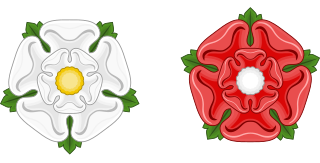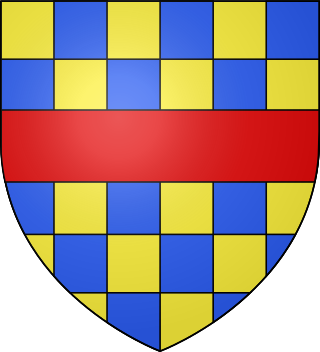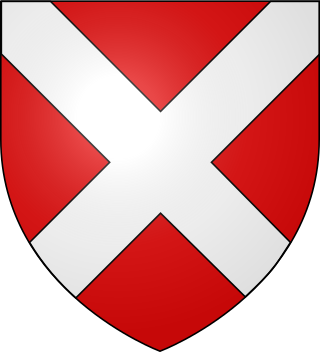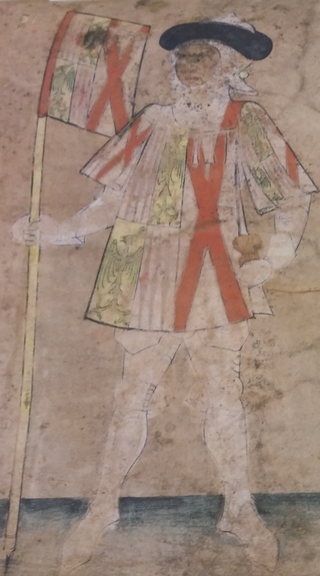Later life
In 1980, Haigh commenced a career in retail, working for major UK based supermarket chains such as Morrisons and Asda Stores. He entered Asda's retail management training program in June 1984 and undertook a number of junior then senior roles within store operations, before finally taking up a central role at Asda's head office in Leeds in 1994. [2]
It was during this time that he commenced his academic writing. In 1998, Haigh left Asda to pursue an I.T. career working in service management and program management for 'blue chip' I.T. organisations such as IBM, Cap Gemini, Sun Microsystems and Computacenter, before working as an independent I.T. consultant specialising in strategic outsourcing and managing large scale transformational business change programs. [3]
In 1999, Haigh founded the Yorkshire Battlefields Society, but after building close links with the Battlefields Trust, the society merged with the trust in 2002. At this time, Haigh became a trustee of the Battlefields Trust and editor of the trusts' journal 'Battlefield' – which was formally the Yorkshire Battlefields Society's quarterly magazine. [4]
Haigh is married with two children (a son Lewis, and a daughter Charlotte). A keen yachtsman, scuba diver and mountain climber (having climbed in the Alps with Kenton Cool), he currently resides in West Yorkshire, where he also serves as a Magistrate on the Leeds 'bench'. [5]
Year 1460 (MCDLX) was a leap year starting on Tuesday of the Julian calendar, the 1460th year of the Common Era (CE) and Anno Domini (AD) designations, the 460th year of the 2nd millennium, the 60th year of the 15th century, and the 1st year of the 1460s decade.

The Battle of Wakefield took place in Sandal Magna near Wakefield in northern England, on 30 December 1460. It was a major battle of the Wars of the Roses. The opposing forces were an army led by nobles loyal to the captive King Henry VI of the House of Lancaster and his Queen Margaret of Anjou on one side, and the army of Richard, Duke of York, the rival claimant to the throne, on the other.

The Battle of Towton took place on 29 March 1461 during the Wars of the Roses, near Towton in North Yorkshire, and "has the dubious distinction of being probably the largest and bloodiest battle on English soil". Fought for ten hours between an estimated 50,000 soldiers in a snowstorm on Palm Sunday, the Yorkist army achieved a decisive victory over their Lancastrian opponents. As a result, Edward IV deposed the Lancastrian Henry VI and secured the English throne.
John Neville, 1st Marquess of Montagu was a major magnate of fifteenth-century England. He was a younger son of Richard Neville, 5th Earl of Salisbury, and the younger brother of Richard Neville, Earl of Warwick, the "Kingmaker".

The Battle of Hexham, 15 May 1464, marked the end of significant Lancastrian resistance in the north of England during the early part of the reign of Edward IV.

Henry Percy, 3rd Earl of Northumberland, was an English magnate.

John Mowbray, 3rd Duke of Norfolk,, Earl Marshal was a fifteenth-century English magnate who, despite having a relatively short political career, played a significant role in the early years of the Wars of the Roses. Mowbray was born in 1415, the only son and heir of John de Mowbray, 2nd Duke of Norfolk, and Katherine Neville. He inherited his titles upon his father's death in 1432. As a minor he became a ward of King Henry VI and was placed under the protection of Humphrey, Duke of Gloucester, alongside whom Mowbray would later campaign in France. He seems to have had an unruly and rebellious youth. Although the details of his misconduct are unknown, they were severe enough for the King to place strictures upon him and separate him from his followers. Mowbray's early career was spent in the military, where he held the wartime office of Earl Marshal. Later he led the defence of England's possessions in Normandy during the Hundred Years' War. He fought in Calais in 1436, and during 1437–38 served as Warden of the Eastern March on the Anglo-Scottish border, before returning to Calais.

Cock Beck is a stream in the outlying areas of East Leeds, West Yorkshire, England, which runs from its source due to a runoff north-west of Whinmoor, skirting east of Swarcliffe and Manston, past Pendas Fields, Scholes, Barwick-in-Elmet, Aberford, Towton, Stutton, and Tadcaster, where it flows into the River Wharfe.

John Clifford, 9th Baron Clifford, 9th Lord of Skipton was a Lancastrian military leader during the Wars of the Roses in England. The Clifford family was one of the most prominent families among the northern English nobility of the fifteenth century, and by the marriages of his sisters, John Clifford had links to some very important families of the time, including the earls of Devon. He was orphaned at twenty years of age when his father was slain by partisans of the House of York at the first battle of the Wars of the Roses, the Battle of St Albans in 1455. It was probably as a result of his father's death there that Clifford became one of the strongest supporters of Margaret of Anjou, wife of King Henry VI, who ended up as effective leader of the Lancastrian faction.
John Neville, Baron Neville was an English nobleman who fought for the House of Lancaster during the Wars of the Roses. He belonged to a senior but impoverished branch of the Neville family of northern England, which had earlier been disinherited in favour of a younger branch headed by John's half–uncle, Richard, Earl of Salisbury. John Neville and his brothers spent several years feuding with Salisbury over the contested inheritance and, when the dynastic wars broke out, John sided with the Lancastrians whilst the junior Nevilles sided with the House of York.

James Butler, 5th Earl of Ormond, Earl of Wiltshire was an Anglo-Irish nobleman and soldier. Butler was a staunch Lancastrian and supporter of Queen consort Margaret of Anjou during the Wars of the Roses. He was beheaded by the victorious Yorkists following the Battle of Towton.

Sir Andrew Trollope was an English professional soldier who fought in the Hundred Years' War and the Wars of the Roses.

Sandal Magna or Sandal is a suburb of Wakefield, West Yorkshire, England with a population in 2001 of 5,432. An ancient settlement, it is the site of Sandal Castle and is mentioned in the Domesday Book. It is 2 mi (3.2 km) south from Wakefield, 8 mi (13 km) north of Barnsley. The Battle of Wakefield was fought here in the 15th century during the Wars of the Roses.
Events from the 1460s in England.

Sir James Strangeways was Speaker of the House of Commons of England between 1461–1462. and a close political ally of Edward IV's Yorkist faction.

The Second Battle of St Albans was fought on 17 February 1461 during the Wars of the Roses in St Albans, Hertfordshire, England.

The Neville–Neville feud was an inheritance dispute in the north of England during the early fifteenth century between two branches of the noble Neville family. The inheritance in question was that of Ralph Neville, 1st Earl of Westmorland, a prominent northern nobleman who had issue from two marriages. Westmorland favoured as his heirs the children of his second wife, Joan Beaufort, closely related to the royal family, over those of his first wife, Margaret Stafford.

Sir Thomas Neville was the second son of Richard Neville, 5th Earl of Salisbury, a major nobleman and magnate in the north of England during the fifteenth-century Wars of the Roses, and a younger brother to the more famous Richard Neville, Earl of Warwick, the 'Kingmaker'. Thomas worked closely with them both in administering the region for the Crown and became a leading player in the turbulent regional politics of northern England in the early 1450s, especially in the Neville family's growing local rivalry with the House of Percy. His wedding in August 1453 is said to have marked the beginning of the armed feud between both houses, in which Thomas and his brother John led a series of raids, ambushes and skirmishes across Yorkshire against the Percy family. Historians describe the feud as setting the stage for the Wars of the Roses, the dynastic struggle between the houses of Lancaster and York for the English throne, and Thomas played a large role in the Neville family's alliance with his uncle, Richard, Duke of York.
The Rose of Rouen is a fifteenth-century carol, written after the Battle of Towton in 1461, eulogizing the Yorkist leader and later King Edward IV, Edward, Earl of March.
Sir Henry Roos, Lord of West Grinstead, was an English knight who served as Constable of Roxburgh Castle (1458–60), Sheriff of Sussex & Surrey and originally fought on the Lancastrian side during the War of the Roses, however was pardoned.












